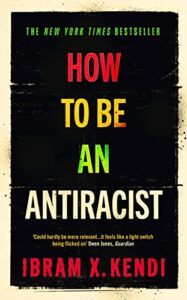Book Review
How to be an Antiracist by Ibram X Kendi.
New York: Random House, 2019.
Submitted by Alison Ruch
 Amidst the crisis of pandemic, which—because of the same racist policies Kendi outlines in his book—disproportionately affects Black and Brown lives, Breonna Taylor, Ahmaud Arbery, and George Floyd were murdered. Three more names added to a devastatingly long list during a global period of devastation. These past few months, more Americans, and more White Americans, than ever before are wanting to understand and create racial equity and are asking: How can I be antiracist? Ibram X. Kendi’s 2019 book could not be a more timely response. It has been sold out and on back-order for months.
Amidst the crisis of pandemic, which—because of the same racist policies Kendi outlines in his book—disproportionately affects Black and Brown lives, Breonna Taylor, Ahmaud Arbery, and George Floyd were murdered. Three more names added to a devastatingly long list during a global period of devastation. These past few months, more Americans, and more White Americans, than ever before are wanting to understand and create racial equity and are asking: How can I be antiracist? Ibram X. Kendi’s 2019 book could not be a more timely response. It has been sold out and on back-order for months.
How to be an Antiracist weaves a strong and deeply-personal argument and narrative that deals with the history of American racism and the ways in which our society has been failing to productively define and eliminate racist policies. He addresses the failures of assimilation, segregation, integration, “color-blindness,” and “post-racialism” in examples from research and personal experience. Kendi’s writing is patient and generous. Each chapter outlines some facet of racism (Power, Behavior, Class, Space, Gender) and offers examples of how racist policies developed out of self-interest of policymakers and how these policies can be replaced with intentional, antiracist actions—with new antiracist policies.
The chapters are sequenced autobiographically, tracking Kendi’s own evolving understanding, defining, and owning of antiracist activism. The son of parents who met over a mutual interest in Black liberation theology, now Professor of African American Studies, author of four books, and Founding Director of the Boston University Center for Antiracist Research, Kendi shares a life steeped in thinking and redirecting thinking about racism in America. He inspires readers to confess, as he confesses, instances of our own racist thinking and actions, and to understand how that thinking and those actions came out of hundreds of years of racist policies born, as he reiterates, of self-interest.
Kendi maintains that efforts to change minds and address the hatred and ignorance that are present in a racist society have been counterproductive. “Treating ignorance and hate and expecting racism to shrink suddenly,” he explains, “seem[s] like treating a cancer patient’s symptoms and expecting the tumors to shrink.” He urges antiracists to focus on tangible, visible racist policies, destroying them or replacing them with antiracist policies.
Clarity, consistency of language use, and personal courage are the firm seams of Kendi’s book. As a guide, Kendi extends his humility to not just outline how one can be an antiracist but how he has grappled with his own dueling consciousness, his own racism, and how he works each day to be an antiracist.
“ The history of racist ideas is the history of powerful policy makers creating racist policies out of self-interest then producing racist ideas to defend and rationalize the inequitable effects of their policies, while everyday people consume those racist ideas, which in turn sparks ignorance and fear. ”
— Ibram X. Kendi

